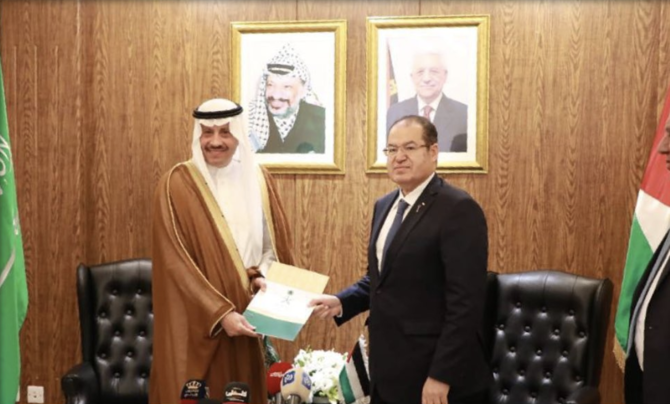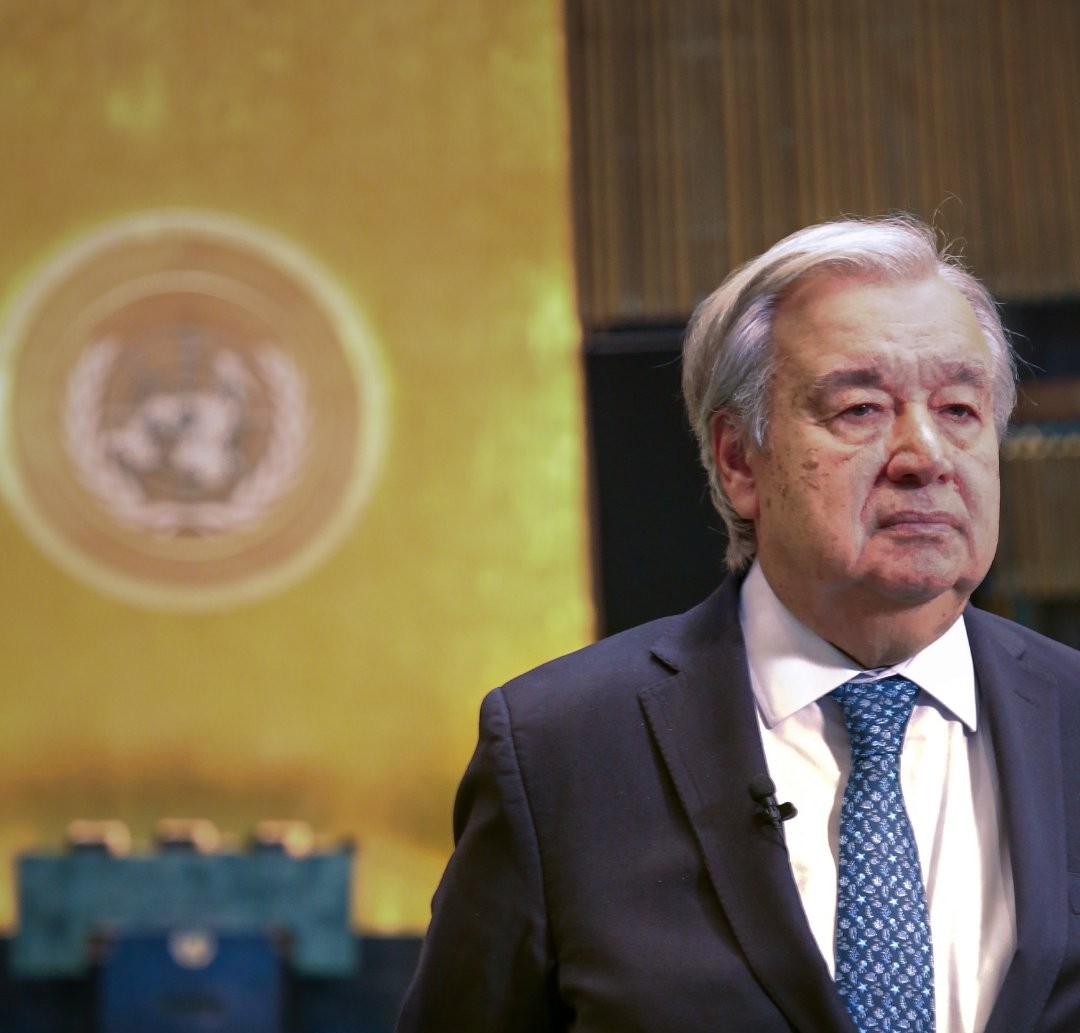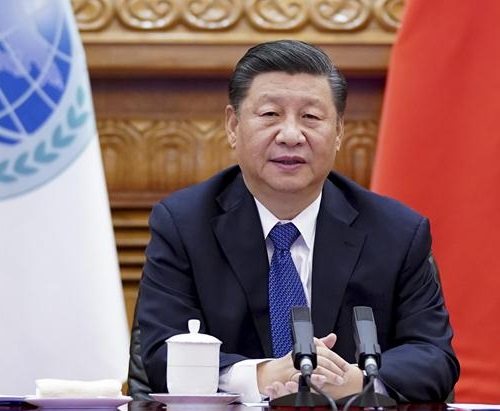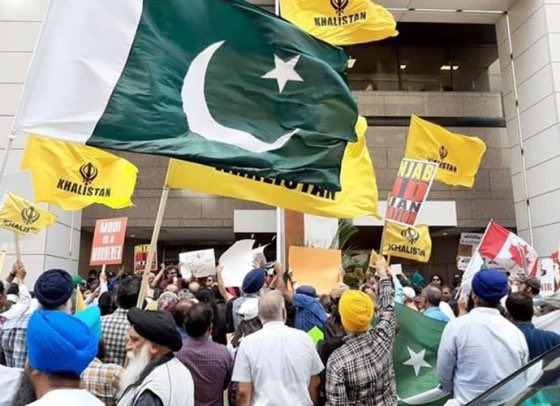Saudi Arabia on Saturday named Naif bin Bandar Al-Sudairi the kingdom’s first ambassador to Palestine…reports Asian Lite News
Saudi Arabia on Saturday named a non-resident ambassador for the Palestinian Territories, who will also serve as consul general for occupied Jerusalem.
The role will be filled by Nayef Al-Sudairi, the current ambassador to Jordan, according to a social media post from the Saudi Foreign Ministry.
Al-Sudairi presented his credentials to Majdi Al-Khalidi, diplomatic affairs advisor to the Palestinian president, at the Palestinian Embassy in Amman.
In a video broadcast on Al-Ekhbariya news channel, Al-Sudairi said the appointment represented “an important step” and underscored the desire of King Salman and Crown Prince Mohammed bin Salman “to strengthen relations with the brothers of the State of Palestine and give it a formal boost in all areas.”
Al-Khalidi said he welcomed the appointment and told Palestinian news agency Wafa that it would “contribute to strengthening the strong and solid brotherly relations that bind the two countries and the two brotherly peoples.”
Riyadh has previously stated that an independent Palestinian state is a precondition for any potential deal with Israel. In recent months, Saudi Arabia has expressed frustration over Israel’s relations with the Palestinians, evident in incidents like the raid on a refugee camp in the West Bank and controversial remarks made by some members of Netanyahu’s coalition.
Meanwhile, the Israeli PM downplayed the Palestinian issue, characterising it as merely a “check box” in the context of a Saudi-Israeli deal. In an interview with Bloomberg Israeli Prime Minister Benjamin Netanyahu indicated that discussions on the matter in corridors and discreet negotiations are far less significant than perceived.
Regarding potential limitations on new Jewish settlements in the West Bank, Netanyahu declined to confirm if he would accept such conditions to reach an agreement with Riyadh.
He asserted that a Palestinian state without Israel’s security control would risk turning into an “Iranian terror state.”
Netanyahu’s stance emphasises the need for Israel to maintain overriding security power in the entire region, both for Israel’s own security and that of the Palestinians.
Meanwhile, a Palestinian was killed and eight were injured on Friday during clashes with Israeli soldiers in the Palestinian refugee camp of Tulkarm in the northern West Bank, local medics and eyewitnesses said.
Mahmoud Jarad, 24 years old, died after he was shot by Israeli soldiers during clashes, said the Palestinian Health Ministry in a press statement.
The statement added that eight other Palestinians were injured by live ammunition fired by Israeli soldiers, and all were evacuated to the governmental hospital in Tulkarm.
Eyewitnesses said that an Israeli army force stormed the refugee camp overnight to arrest Palestinians wanted by Israeli security forces for being involved in attacks against Israel.
Israeli soldiers raided dozens of houses in the refugee camp, and fierce clashes erupted between dozens of Palestinian protesters and the Israeli soldiers, said the eyewitnesses.
Israel Radio reported that an Israeli army force raided the Tulkarm refugee camp as part of a regular security activity, adding that during the operation, Palestinian gunmen opened fire at the force and the soldiers opened fire at them.
The Israeli army has been carrying out daily raids on Palestinian towns and cities all over the West Bank, to arrest Palestinians involved in carrying out or planning attacks against Israel.
Since January, 27 people, most of them Israelis, have been killed in a series of attacks carried out by Palestinians, and more than 200 Palestinians, including children and women, were killed by Israeli soldiers and settlers, according to official figures.
Israelis ties with S. Arabia
Israeli Prime Minister Benjamin Netanyahu earlier expressed confidence in forging a deal with Saudi Arabia that would lead to official diplomatic ties between the two nations. However, even without formal recognition, Netanyahu believes the countries can establish an “economic corridor” spanning from the Arabian Peninsula to Europe, encompassing energy, transport, and communications technology.
During a recent television interview with Bloomberg, Netanyahu asserted that this economic partnership is achievable, regardless of the status of formal peace between the two nations. Nevertheless, it remains uncertain whether Saudi Arabia would be willing to accept such deeper connections, given the prevailing opposition to the recognition of Israel among the kingdom’s public.
Netanyahu has been an advocate of normalising ties between Israel and Saudi Arabia, citing the potential economic benefits for both nations and the potential deterrence against Iran’s aggressive interference in the region, particularly concerning oil-shipping routes.
While Saudi Arabia and Iran restored diplomatic relations earlier in a deal brokered by China, Riyadh continues to view Tehran with suspicion, considering it a geopolitical rival.
US President Joe Biden is also eager for Saudi Arabia to recognise Israel and sent National Security Adviser Jake Sullivan to discuss the issue with Crown Prince Mohammed bin Salman last month.
Netanyahu emphasized that the economic consequences of such recognition would be significant for investors, expressing his belief that the odds are favourable. However, Netanyahu said he cannot guarantee the outcome.














